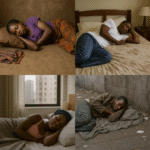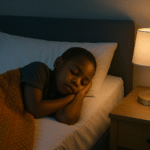Why Africans Sleep Less: Stress, Cities & Screen Time

Sleep is becoming a scarce resource across Africa. Once guided by natural rhythms of sunrise and sunset, today’s lifestyles — shaped by busy cities, economic pressure, and technology — are cutting deep into rest. From Lagos to Nairobi and Johannesburg, many Africans are sleeping fewer hours than ever before. The result is rising fatigue, health challenges, and lost productivity. Why is this happening, and what can be done to restore balance?
Cities That Never Sleep
Africa is urbanizing faster than any other continent. By 2050, more than half of Africans will live in cities. This shift brings opportunity, but also significant sleep disruption.
-
Long Commutes – In Lagos, traffic can consume 3–6 hours daily. Early departures and late arrivals mean many people sleep less than 5 hours.
-
Noise Pollution – Generators, nightlife, and busy streets keep urban neighborhoods loud well past midnight.
-
Overcrowding – Shared rooms and cramped housing reduce comfort, privacy, and quality of sleep.
Urban life may promise growth, but it often steals rest.
Stress and the Hustle Economy
Africa’s youthful population is ambitious, but economic realities are tough. Many juggle multiple jobs, side hustles, or night shifts to make ends meet.
-
Job insecurity forces people to work long hours.
-
Financial worries about rent, food, and school fees keep the mind racing at night.
-
Shift work in hospitals, security, and transport disrupts natural sleep cycles.
While the hustle fuels ambition, it also creates burnout, fatigue, and chronic sleep debt.
Screen Time and the Digital Lifestyle
Technology is transforming Africa, but it’s also reshaping sleep. Smartphones, social media, and digital work keep people connected — often at the cost of rest.
-
Late-night scrolling on TikTok, Instagram, and WhatsApp delays sleep.
-
Blue light exposure from screens blocks melatonin, the hormone that induces sleep.
-
Remote work & global gigs push young Africans to stay awake for clients across time zones.
Instead of winding down, many spend midnight hours on screens, pushing sleep further away.
Health Risks of Sleeping Less
The impact of reduced sleep is more than just feeling tired. It creates serious health risks:
-
Weakened immunity → more frequent colds and infections.
-
Poor mental health → anxiety, depression, and burnout.
-
Chronic diseases → higher risk of diabetes, hypertension, and heart disease.
-
Lower productivity → slower thinking, poor focus, and more mistakes at work.
Ironically, in trying to hustle harder, people lose the energy needed to succeed.
Traditional Wisdom About Rest
Before urbanization and digital distractions, African communities lived in harmony with natural cycles. Farmers rose with the sun, rested at night, and often enjoyed short afternoon naps. Herbal teas such as lemongrass or hibiscus were used to promote calm and relaxation.
Culturally, sleep and dreams were seen as important for health and even spiritual guidance. This wisdom reminds us that sleep is not laziness — it is strength.
How Africans Can Reclaim Rest
1. Community & Policy Solutions
-
Governments can improve urban planning, reduce traffic, and regulate noise.
-
Employers can promote flexible working hours and discourage excessive overtime.
2. Personal Lifestyle Choices
-
Digital boundaries: Switch off screens an hour before bed.
-
Bedtime rituals: Herbal teas, prayer, or meditation to signal rest.
-
Cooling hacks: Fans, light bedding, and natural ventilation to manage heat.
-
Power naps: 20–30 minute naps to recharge without disrupting night sleep.
3. Cultural Mindset Shift
Changing the narrative that “sleep is weakness” is essential. Rest is not the enemy of hustle — it is the foundation that makes success possible.
Conclusion
Africans are sleeping less today due to stress, cities, and screen time. But sleep is not a luxury; it is a vital pillar of health, productivity, and long life. By blending modern solutions with traditional wisdom, Africans can restore balance and reclaim rest.
A future of innovation and growth must also be a future where Africans sleep well.
Written by Fawzi Rufai, Medically Reviewed by Sesan Kareem



